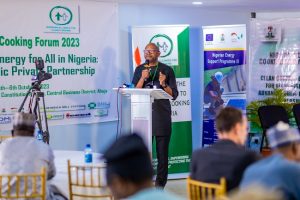Stakeholders in Nigeria’s clean cooking sector have renewed their commitments to implementing various strategies to deepen the deployment and use of clean and improved cooking methods in the country. These commitments were made during the Nigeria Clean Cooking forum, held from October 5 to 6, 2023, in Abuja.

In his opening speech, Dr. Iziaq Adekunle Salako, Minister of State for Environment, highlighted the importance of sustainable cooking practices. He emphasised that such practices would help to reduce air pollution and improve public health.
Dr. Salako also stressed the need for collaboration between the government, private sector, and civil society to implement practical solutions. He commended the Nigerian Alliance for Clean Cooking for its efforts towards achieving this objective.
He said: “As Nigeria strives to meet its obligations under the Nationally Determined Contributions (NDCs) and the long-term carbon emission reduction commitments by 2060, it is crucial to have a joint collaborative effort to encourage Nigerian households to switch from inefficient cooking fuels like fuelwood, charcoal, and kerosene to LPG and other efficient cooking solutions. The future of our planet depends on it, and the Nigerian Alliance for Clean Cooking is the best means of achieving this noble objective.”
Speaking during the opening ceremony, Senator Seriake Henry Dickson, Chairman, Senate Committee on Ecology and Climate Change, pledged to facilitate inter-ministerial and inter-agency collaboration on clean cooking advocacy at all levels of government. He promised to push the clean cooking agenda further on policy forums like the National Economic Council where all state governors meet.
Senator Dickson assured that the Senate Committee is developing a template for engaging with all relevant ministries and agencies to optimise national assets in advancing clean cooking in Nigeria and promised that the legislature would work with the Nigerian Alliance for Clean Cooking to promote clean cooking in Nigeria.
In his goodwill message, the Senate Committee Chairman on Environment, Senator Yunus Akintunde, also committed to ensuring that the clean cooking sector becomes more sustainable and accessible to all Nigerians.
He said: “We are determined to work closely with relevant stakeholders, especially the Nigerian Alliance for Clean Cooking, on legislative measures that would accelerate the transition towards cleaner and healthier cooking practices in Nigeria.”
In his address, the Country Director of Heinrich Boell Foundation, Jochen Luckscheiter, highlighted the importance of sustainable development in addressing the pressing environmental challenges faced by the country. He emphasised the need for collaborative efforts and innovative solutions to achieve clean cooking in Nigeria.
He commended the leadership of the Nigerian Alliance for Clean Cooking for sustaining the discussion on clean cooking in Nigeria and pledged continuous support to the Alliance.
Earlier, Ewah Eleri, the Chairman, Board of Trustees of the Nigerian Alliance for Clean Cooking, emphasised the need for the government to take more significant action towards clean cooking, particularly in implementing the clean cooking policy.
According to him, the value of such a policy lies in the government’s effort, appropriation, and implementation of funds to support clean cooking initiatives. He further stressed the importance of having an enforceable law to guide the government’s conduct in this area, as it will help resolve the problem.
“Therefore, a legislative framework is essential to enjoy the co-benefits of clean cooking fully,” he concluded.
The 2023 Forum tagged, “Clean Cooking Energy for All in Nigeria: Advancing Public Private Partnership”, was co-hosted by the Nigeria Energy Support Programme (NESP), International Organisation for Migration (IOM), Burn Manufacturing Ltd, Toyola Energy Group, ICEED and Green Energy Biofuels, among other stakeholders. It had in attendance over 200 participants.
Other important dignitaries that graced the occasion include the representative of the Chairman of the House Committee on Environment, representatives of the Ministers of Agriculture, Women Affairs and Health, among other MDAs, and representatives of European Union Delegation to Nigeria and West Africa, Commissioner of Environment in Niger State, Commissioner of Environment in Anambra State, and other stakeholders from across Nigeria.
